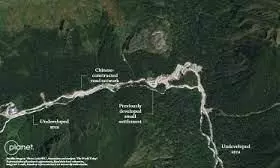
China continues construction in Bhutan's Jakarlung Valley despite ongoing diplomatic talks
text_fieldsDespite the ongoing border talks between Bhutan and China, unauthorised construction by China persists in North Bhutan's Jakarlung Valley.
Satellite images reveal substantial development in the region, suggesting a growing physical presence by China, posing challenges for Bhutan's response.
Expert opinions regarding China's recent territorial claims and settlements in the Jakarlung Valley emphasise the precarious position Bhutan finds itself in.
Professor Robert Barnett highlighted China's recent and unprecedented claim over the area, leading to the unilateral establishment of villages, military posts, and outposts, significantly impacting Bhutan's cultural and religious significance in the Beyul Khenpajong area.
"This is a case of China making a claim to an area, based on earlier grazing practices by herders," said Barnett, an expert on Tibetan history at the School of Oriental and African Studies (SOAS) at the University of London.
Satellite images, analysed by Damien Symon, demonstrate an extensive surge in construction activities over two years in the Jakarlung Valley. The scale of this development indicates a deliberate and comprehensive endeavour supporting China's territorial ambitions, significantly altering the Bhutanese landscape.
In recent months, Bhutan has engaged with China to address incursions into its territory. Foreign Minister Tandi Dorji's visit to Beijing and Prime Minister Lotay Tshering's hope for a clear demarcation underscore Bhutan's efforts. Notably, Tshering didn't rule out the prospect of a land swap, hinting at the possibility of territorial negotiations.
However, India, historically a guarantor of Bhutan's security, is concerned about the strategic implications. China's actions, reminiscent of its territorial expansion tactics in other regions, notably the South China Sea and Eastern Ladakh, have raised alarms in New Delhi.
The construction of villages by China along the Amu Chu river valley, adjacent to the Doklam plateau, worries India due to its proximity to the Siliguri Corridor, a crucial link connecting India's Northeast.
General Bipin Rawat characterised China's incremental territorial strategy as "salami-slicing," emphasising its consistent approach in multiple territorial disputes. Claude Arpi highlighted the lack of capacity for Bhutan's Royal Army to counter Chinese advances or construction activities.
The ongoing talks could lead to a significant geostrategic shift in the region, potentially aligning Bhutan more closely with China. However, the extent of India's influence and the evolving security dynamics between Delhi and Thimphu remain uncertain.























